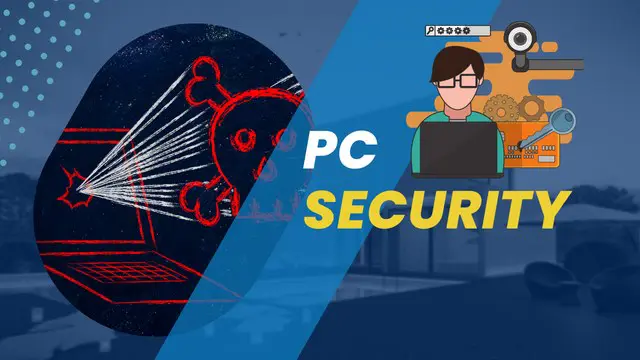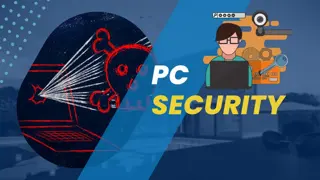
PC Security Training
CPD Certified| Free PDF Certificate | Lifetime Access | Learner Support | No Hidden Fees | 100% Success Rate
EDURISE
Summary
- Certificate of completion - Free
- Reed courses certificate of completion - Free
- Tutor is available to students
Add to basket or enquire
Overview
Fortify Your Digital World with PC Security Training!
In today's digital age, where technology underpins every aspect of our lives, the demand for comprehensive PC security knowledge is greater than ever. The PC Security Training course is your shield against cyber threats, equipping you with the skills to protect your digital assets, business, and personal data from potential breaches.
Analyzing Demand:
The demand for PC security training is driven by several key factors:
Cybersecurity Threats: The ever-evolving landscape of cyber threats, including malware, ransomware, and phishing attacks, has created an urgent need for individuals and businesses to bolster their security measures.
Data Protection: With the increasing reliance on digital data storage, the importance of safeguarding sensitive information has become a top priority for organizations, making cybersecurity experts indispensable.
Remote Work: The shift to remote work has expanded vulnerabilities, with remote workers requiring enhanced cybersecurity knowledge to protect themselves and their employers.
Digital Privacy: Concerns over digital privacy and personal data security have surged, emphasizing the need for individuals to understand and control their online footprint.
Business Insights:
The PC Security Training course offers numerous advantages to businesses and entrepreneurs:
Data Security: Businesses can safeguard their sensitive data, including customer information and proprietary data, by educating employees on robust cybersecurity practices.
Preventing Data Breaches: Businesses can reduce the risk of data breaches, protecting their reputation and avoiding potentially significant financial losses.
Compliance: Compliance with data protection regulations, such as GDPR and HIPAA, is essential. This course ensures businesses adhere to regulatory standards.
Career Advancement:
For individuals, mastering PC security opens doors to various career opportunities:
Cybersecurity Analysts: Individuals can pursue careers as cybersecurity analysts, responsible for protecting systems and networks from cyber threats.
Information Security Specialists: Information security specialists are in demand to develop and implement security measures and policies within organizations.
IT Support Specialists: IT support professionals can expand their expertise to include cybersecurity, offering valuable support to their organizations.
Consultants: PC security experts can become consultants, offering advice and guidance to businesses and individuals seeking to enhance their digital security.
In conclusion, the PC Security Training course is your gateway to a world of digital protection and data security. Whether you're a business looking to fortify your cybersecurity measures, an individual concerned about personal data security, or an entrepreneur seeking to establish cybersecurity services, this course equips you with the knowledge to thrive in the realm of PC security.
Free Gift
- Course Completion PDF Certificate
- Tutor Support
Curriculum
Course media
Description
Learning Outcomes:
Chapter 1: Spam and Malware
- Develop a deep understanding of spam and malware, including their various forms and the risks they pose to personal and organizational digital security.
- Acquire knowledge of strategies and tools for identifying and mitigating spam and malware threats effectively.
- Build the skills to educate and inform others about the importance of recognizing and countering spam and malware in digital communication and environments.
Chapter 2: Phishing and Viruses
- Gain expertise in recognizing and combatting phishing attacks, understanding the tactics used by cybercriminals to deceive individuals and steal sensitive information.
- Develop the ability to identify and respond to virus threats, safeguarding digital devices and data from malicious software intrusions.
- Acquire the skills to educate and train individuals and teams to recognize and avoid falling victim to phishing and virus attacks.
Chapter 3: Software Protection
- Master the principles of software protection and the importance of securing software applications against vulnerabilities and exploitation.
- Develop knowledge of best practices and strategies for securing software, including encryption, authentication, and secure coding practices.
- Build the expertise to assess, implement, and maintain software security measures, safeguarding against potential breaches and data leaks.
Module Descriptions:
Chapter 1: Spam and Malware This module delves into the world of spam and malware, offering insights into the various forms of these digital threats. Learners will gain an understanding of the risks posed by spam and malware and explore strategies and tools to identify and combat these threats effectively.
Chapter 2: Phishing and Viruses In this module, participants will become proficient in recognizing and responding to phishing attacks, as well as understanding the tactics used by cybercriminals to deceive individuals. They will also learn to identify and combat virus threats, ensuring the security of digital devices and data.
Chapter 3: Software Protection The final module focuses on the critical topic of software protection. Participants will master the principles of safeguarding software against vulnerabilities and exploitation. They will gain knowledge of best practices and strategies for securing software applications, including encryption, authentication, and secure coding practices. Participants will learn to assess, implement, and maintain software security measures effectively.
These modules provide a comprehensive education in the field of PC security, covering essential topics related to digital threats and protective measures. Whether you are an individual looking to enhance your digital security or a business seeking to educate your team on cybersecurity, this course equips you with the knowledge and skills to safeguard your digital world effectively.
Certificate of Completion
After completing the PC Security diploma course, you will be able to obtain your free PDF certificate of course completion.
Who is this course for?
Ideal Audience:
Digital Citizens: This course is tailored for individuals who want to enhance their digital literacy and protect their personal information in an increasingly online world. It provides essential knowledge for staying safe from online threats.
Remote Workers: With the rise of remote work, individuals working from home or remotely need to be vigilant against cyber threats. This course equips them with the skills to identify and combat phishing, viruses, and malware.
Small Business Owners: Small business owners, especially those who lack dedicated IT departments, can benefit from this course to understand and implement basic cybersecurity measures to safeguard their business data and customer information.
Parents and Guardians: With children spending more time online for education and entertainment, parents and guardians can use this course to protect their children from online threats and educate them about responsible digital practices.
Seniors: Seniors, who may be more susceptible to online scams, phishing, and malware, can enhance their cybersecurity awareness through this course, enabling them to enjoy the benefits of the digital world safely.
Entry-Level IT Professionals: Individuals aspiring to enter the field of information technology can use this course as a foundational knowledge resource for cybersecurity, which is vital in IT roles.
In summary, the PC Security Training course is suitable for a diverse audience, including digital citizens, remote workers, small business owners, parents, seniors, and entry-level IT professionals. It equips individuals with the knowledge to protect themselves and others from common online threats, making it an essential resource in the digital age.
Requirements
The PC Security course has no formal entry requirements.
Career path
Cybersecurity Specialist: With expertise from the PC Security Training, aim for a career in cybersecurity, with the potential to earn a UK salary ranging from £30,000 to £50,000 annually.
Security Expert: Become a recognized authority in PC security, unlocking a world of opportunities with potential earnings exceeding £60,000 annually in the UK as a seasoned cybersecurity professional.
Questions and answers
Currently there are no Q&As for this course. Be the first to ask a question.
Certificates
Certificate of completion
Digital certificate - Included
Reed courses certificate of completion
Digital certificate - Included
Will be downloadable when all lectures have been completed
Reviews
Currently there are no reviews for this course. Be the first to leave a review.
Legal information
This course is advertised on reed.co.uk by the Course Provider, whose terms and conditions apply. Purchases are made directly from the Course Provider, and as such, content and materials are supplied by the Course Provider directly. Reed is acting as agent and not reseller in relation to this course. Reed's only responsibility is to facilitate your payment for the course. It is your responsibility to review and agree to the Course Provider's terms and conditions and satisfy yourself as to the suitability of the course you intend to purchase. Reed will not have any responsibility for the content of the course and/or associated materials.


